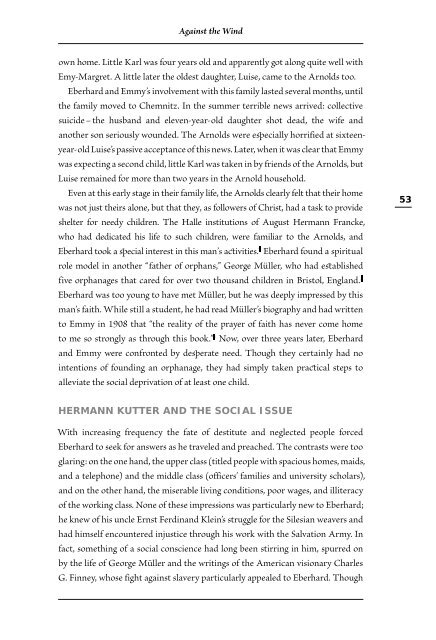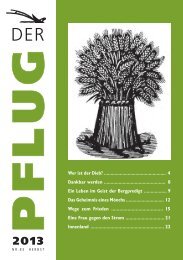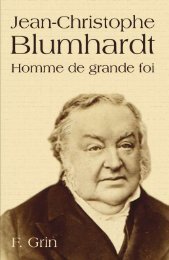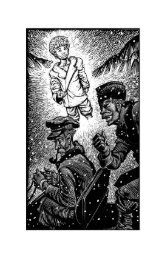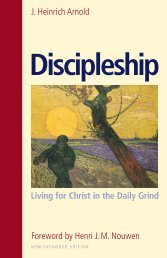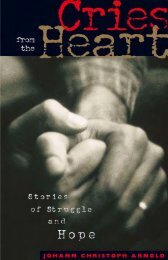Against the Wind: Eberhard Arnold and the Bruderhof - Plough
Against the Wind: Eberhard Arnold and the Bruderhof - Plough
Against the Wind: Eberhard Arnold and the Bruderhof - Plough
You also want an ePaper? Increase the reach of your titles
YUMPU automatically turns print PDFs into web optimized ePapers that Google loves.
<strong>Against</strong> <strong>the</strong> <strong>Wind</strong><br />
own home. Little Karl was four years old <strong>and</strong> apparently got along quite well with<br />
Emy-Margret. A little later <strong>the</strong> oldest daughter, Luise, came to <strong>the</strong> <strong>Arnold</strong>s too.<br />
<strong>Eberhard</strong> <strong>and</strong> Emmy’s involvement with this family lasted several months, until<br />
<strong>the</strong> family moved to Chemnitz. In <strong>the</strong> summer terrible news arrived: collective<br />
suicide – <strong>the</strong> husb<strong>and</strong> <strong>and</strong> eleven-year-old daughter shot dead, <strong>the</strong> wife <strong>and</strong><br />
ano<strong>the</strong>r son seriously wounded. The <strong>Arnold</strong>s were esecially horrified at sixteen-<br />
year-old Luise’s passive acceptance of this news. Later, when it was clear that Emmy<br />
was expecting a second child, little Karl was taken in by friends of <strong>the</strong> <strong>Arnold</strong>s, but<br />
Luise remained for more than two years in <strong>the</strong> <strong>Arnold</strong> household.<br />
Even at this early stage in <strong>the</strong>ir family life, <strong>the</strong> <strong>Arnold</strong>s clearly felt that <strong>the</strong>ir home<br />
was not just <strong>the</strong>irs alone, but that <strong>the</strong>y, as followers of Christ, had a task to provide<br />
shelter for needy children. The Halle institutions of August Hermann Francke,<br />
who had dedicated his life to such children, were familiar to <strong>the</strong> <strong>Arnold</strong>s, <strong>and</strong><br />
<strong>Eberhard</strong> took a secial interest in this man’s acivities. 2 <strong>Eberhard</strong> found a spiritual<br />
role model in ano<strong>the</strong>r “fa<strong>the</strong>r of orphans,” George Müller, who had esablished<br />
five orphanages that cared for over two thous<strong>and</strong> children in Bristol, Engl<strong>and</strong>. 3<br />
<strong>Eberhard</strong> was too young to have met Müller, but he was deeply impressed by this<br />
man’s faith. While still a student, he had read Müller’s biography <strong>and</strong> had written<br />
to Emmy in 1908 that “<strong>the</strong> reality of <strong>the</strong> prayer of faith has never come home<br />
to me so strongly as through this book.” 4 Now, over three years later, <strong>Eberhard</strong><br />
<strong>and</strong> Emmy were confronted by deserate need. Though <strong>the</strong>y certainly had no<br />
intentions of founding an orphanage, <strong>the</strong>y had simply taken pracical steps to<br />
alleviate <strong>the</strong> social deprivation of at least one child.<br />
hErmann kuttEr <strong>and</strong> thE SoCial iSSuE<br />
With increasing frequency <strong>the</strong> fate of destitute <strong>and</strong> neglected people forced<br />
<strong>Eberhard</strong> to seek for answers as he traveled <strong>and</strong> preached. The contrasts were too<br />
glaring: on <strong>the</strong> one h<strong>and</strong>, <strong>the</strong> upper class (titled people with spacious homes, maids,<br />
<strong>and</strong> a telephone) <strong>and</strong> <strong>the</strong> middle class (officers’ families <strong>and</strong> university scholars),<br />
<strong>and</strong> on <strong>the</strong> o<strong>the</strong>r h<strong>and</strong>, <strong>the</strong> miserable living conditions, poor wages, <strong>and</strong> illiteracy<br />
of <strong>the</strong> working class. None of <strong>the</strong>se impressions was particularly new to <strong>Eberhard</strong>;<br />
he knew of his uncle Ernst Ferdin<strong>and</strong> Klein’s struggle for <strong>the</strong> Silesian weavers <strong>and</strong><br />
had himself encountered injustice through his work with <strong>the</strong> Salvation Army. In<br />
fact, something of a social conscience had long been stirring in him, spurred on<br />
by <strong>the</strong> life of George Müller <strong>and</strong> <strong>the</strong> writings of <strong>the</strong> American visionary Charles<br />
G. Finney, whose fight against slavery particularly appealed to <strong>Eberhard</strong>. Though<br />
53


